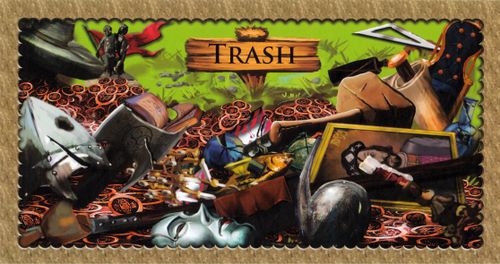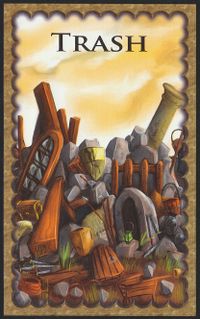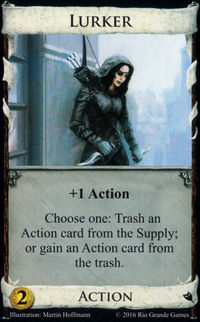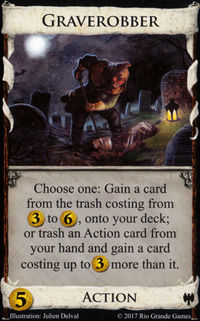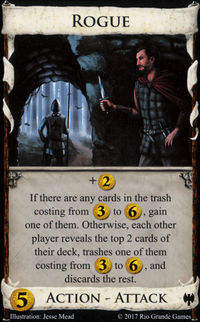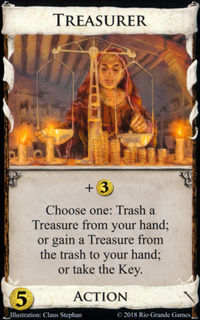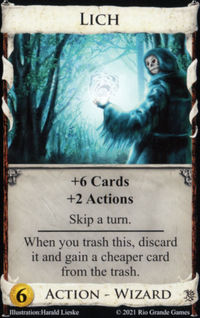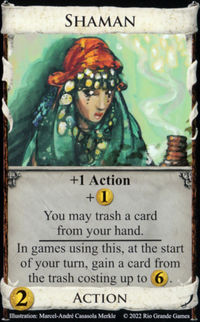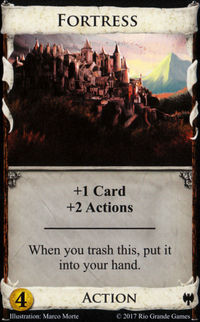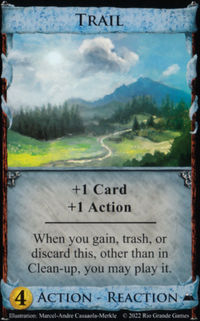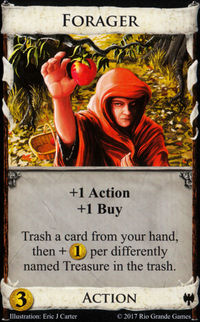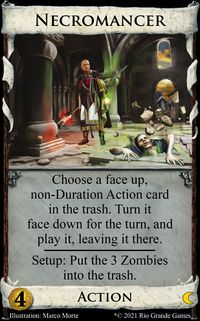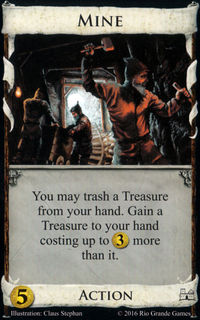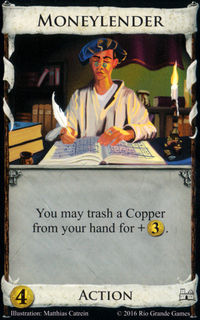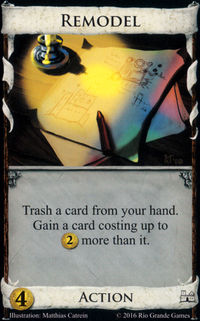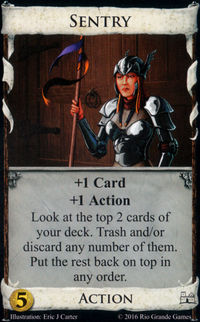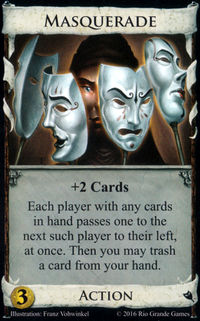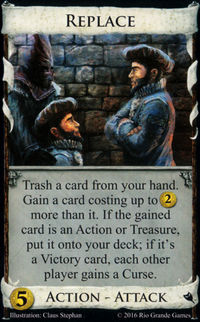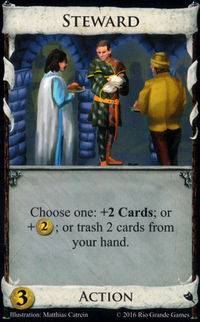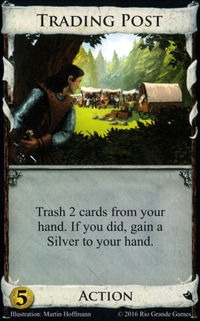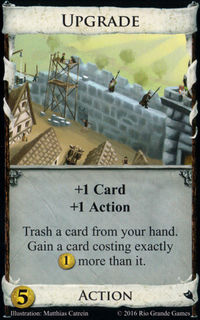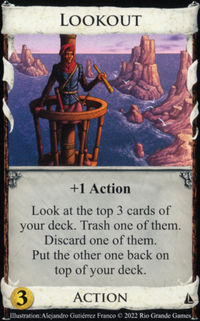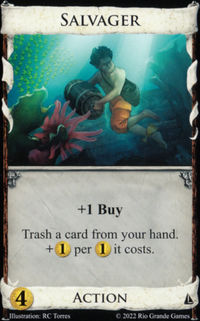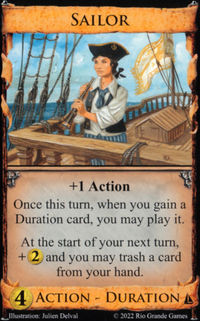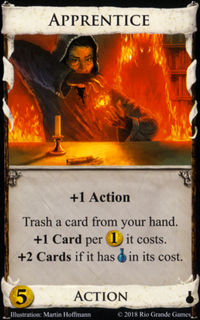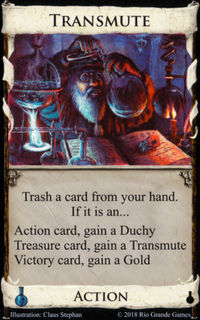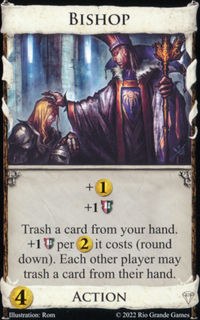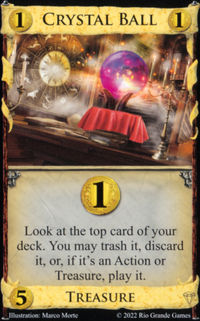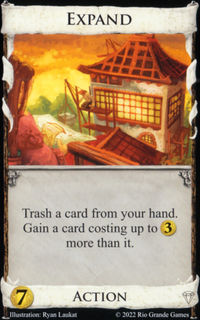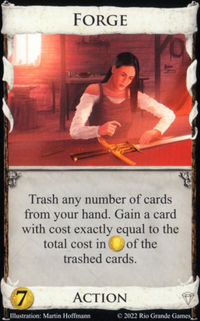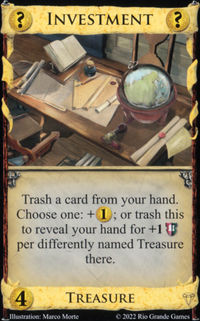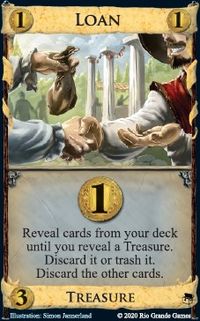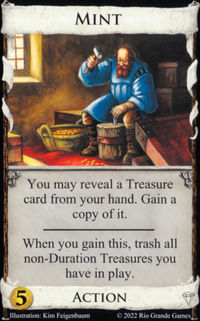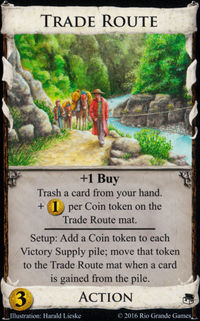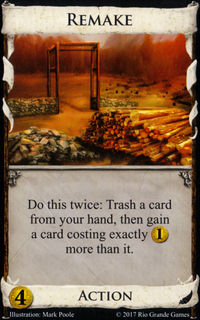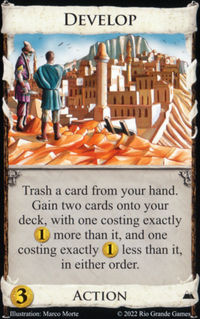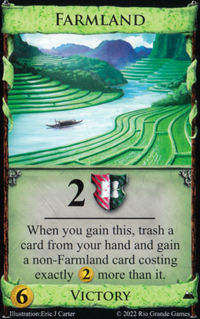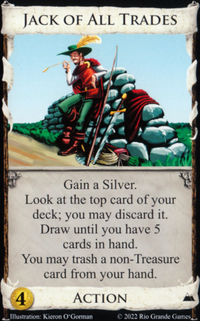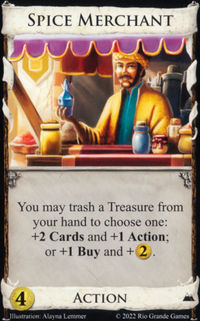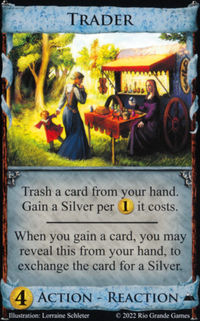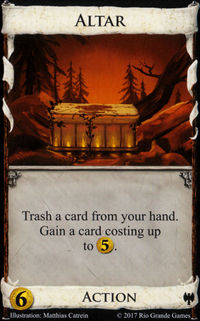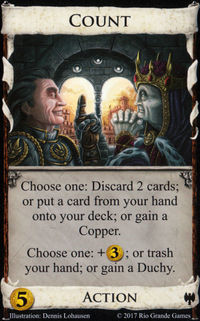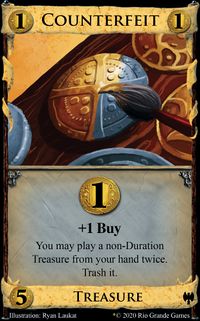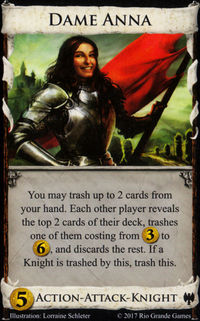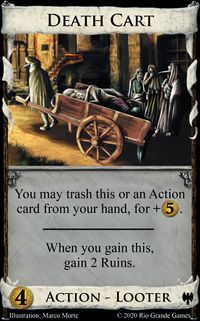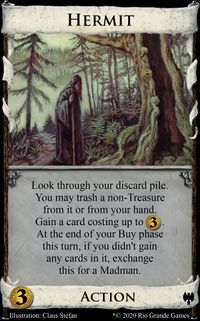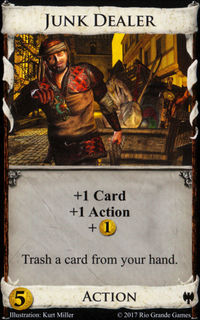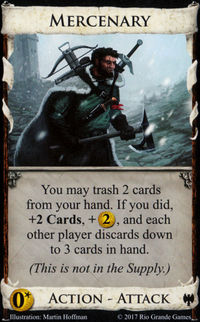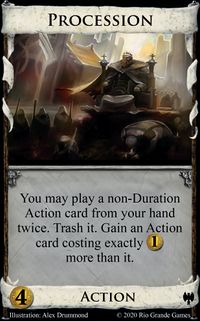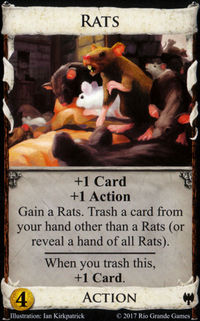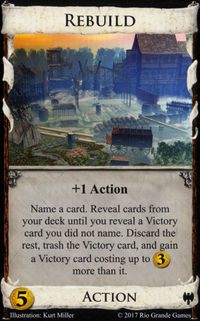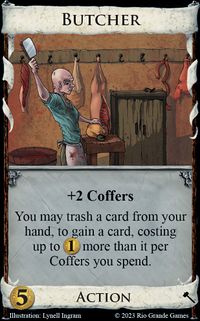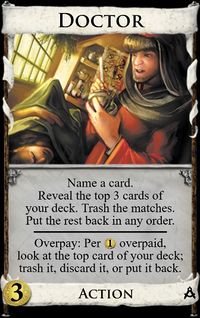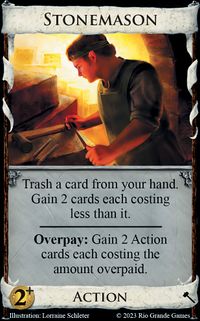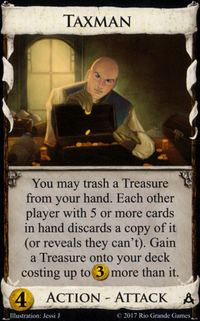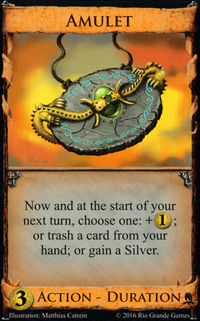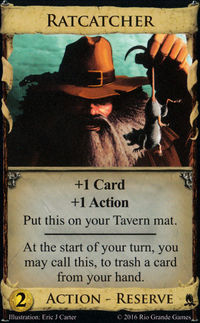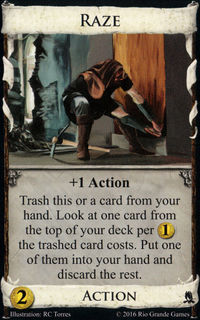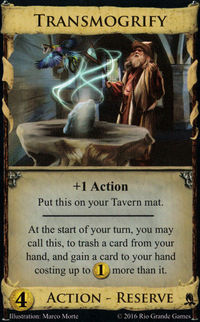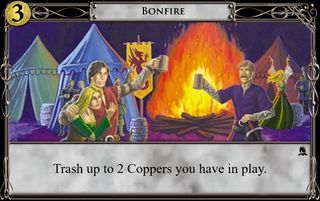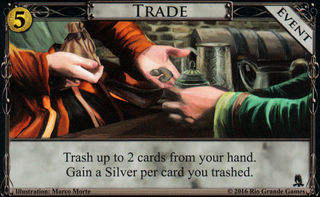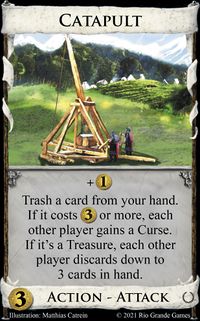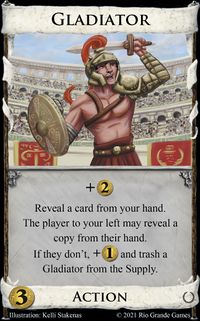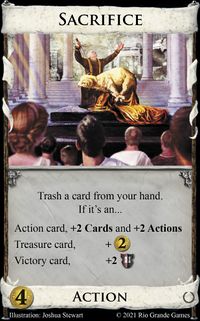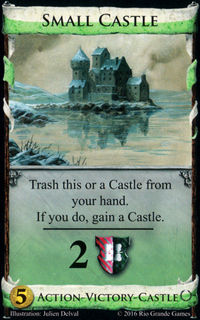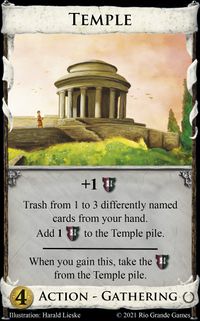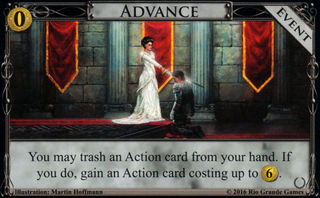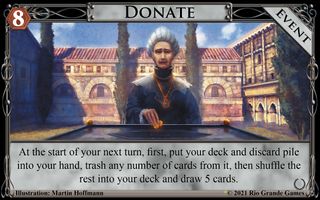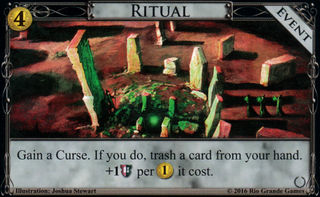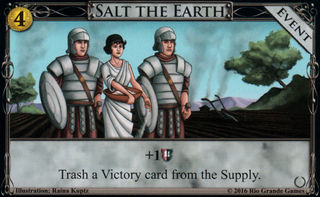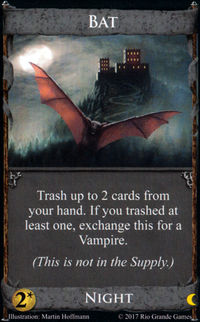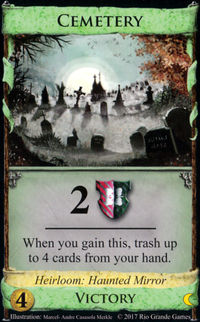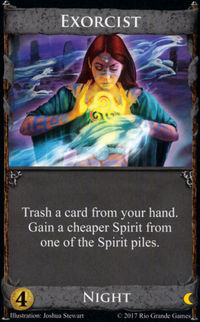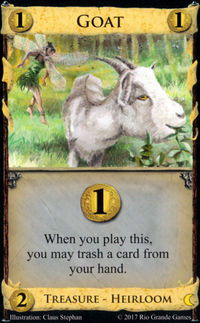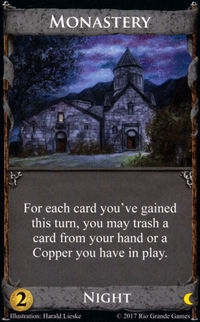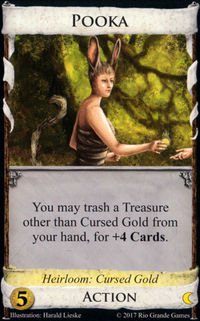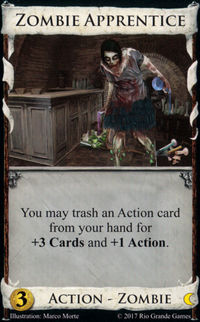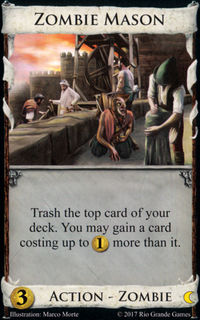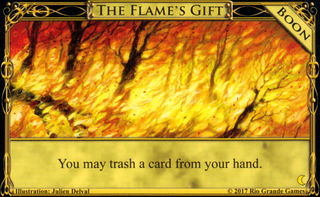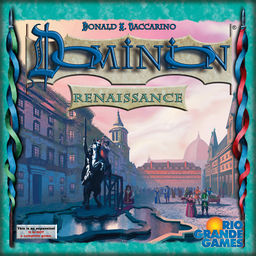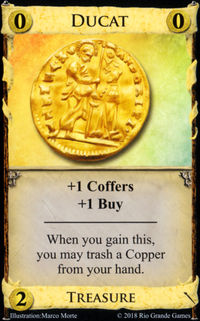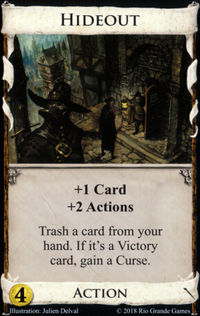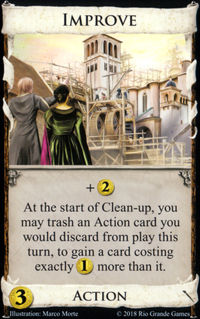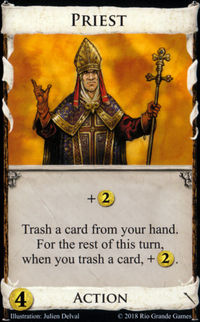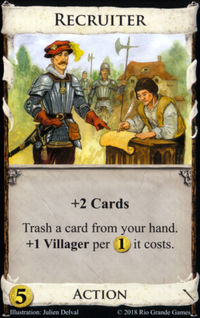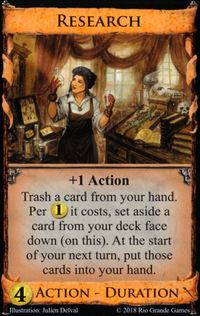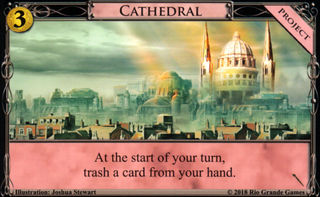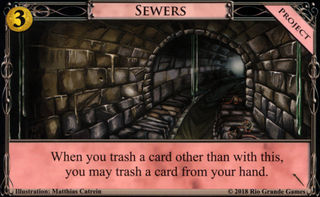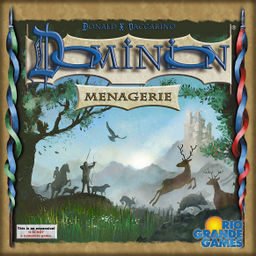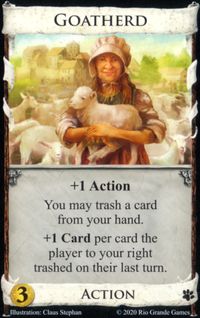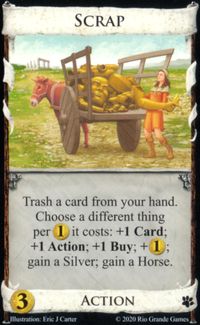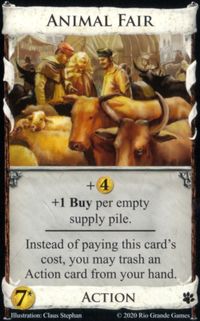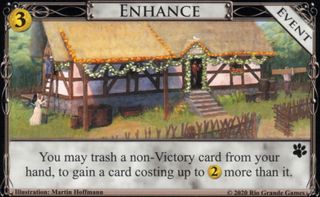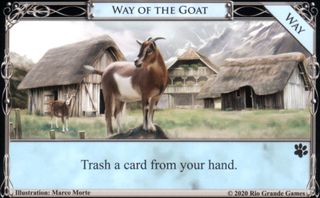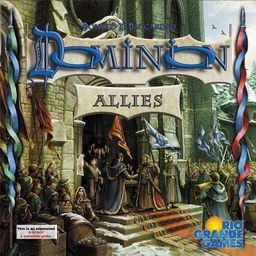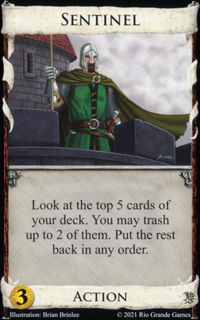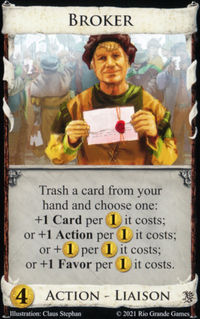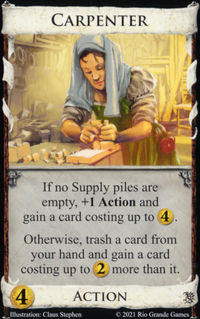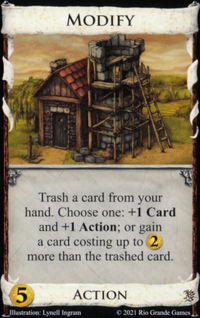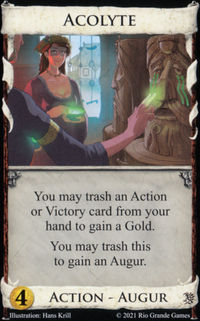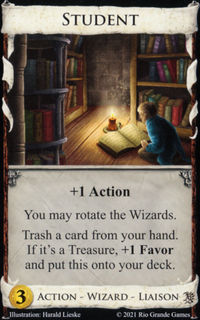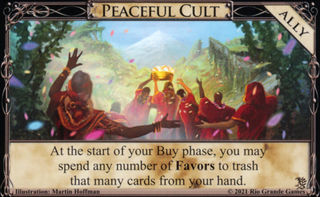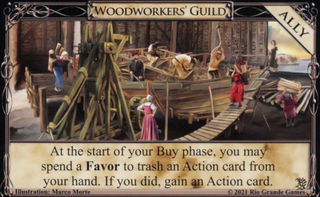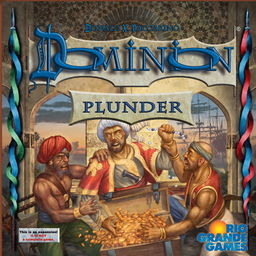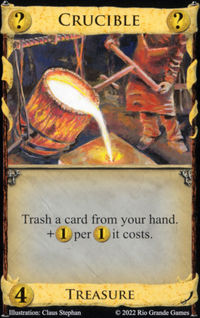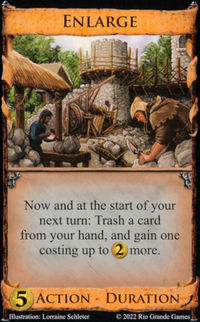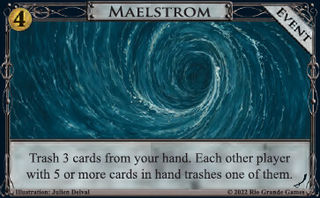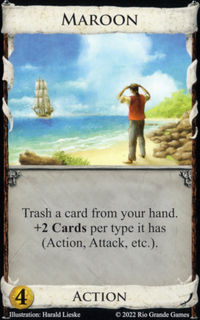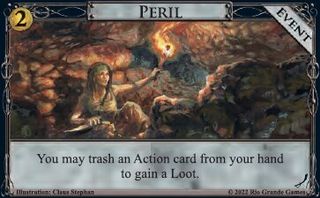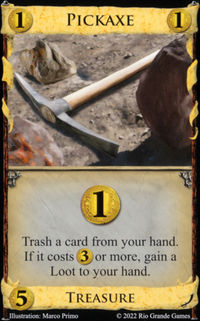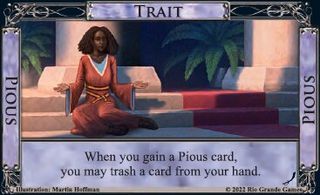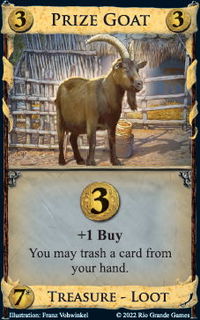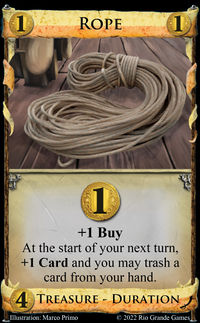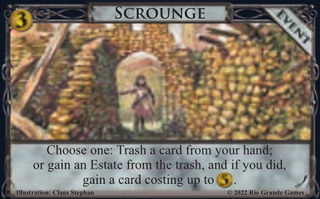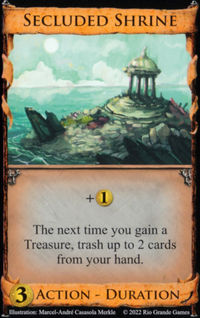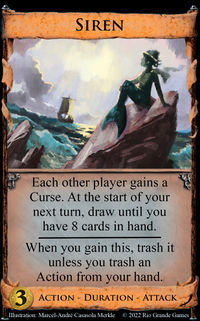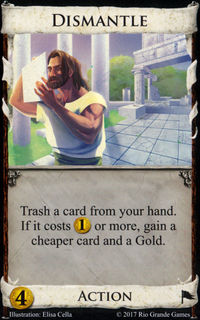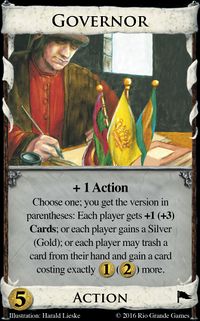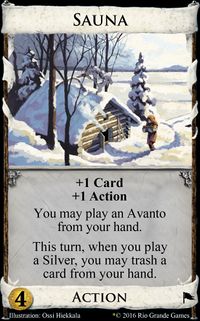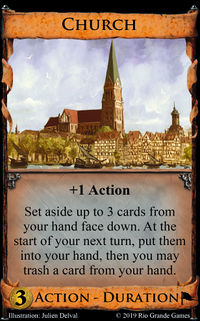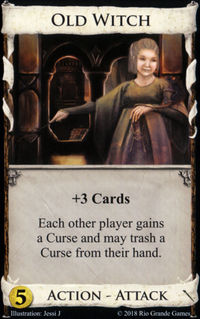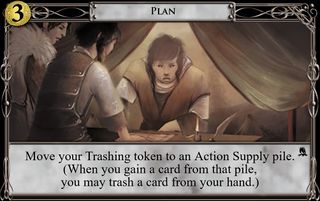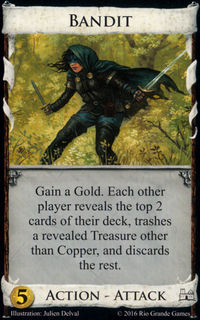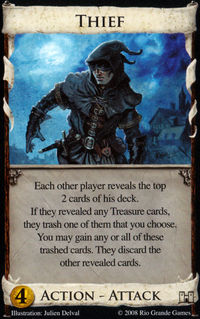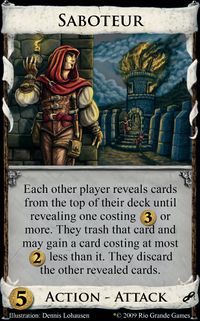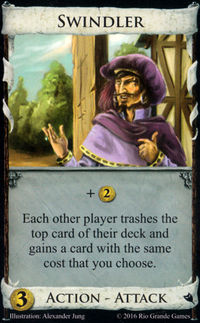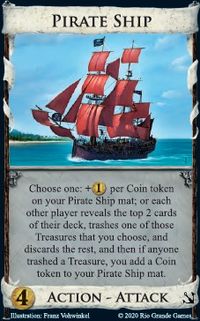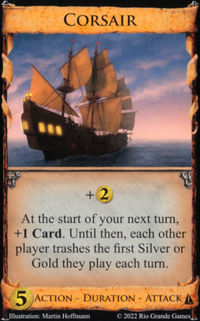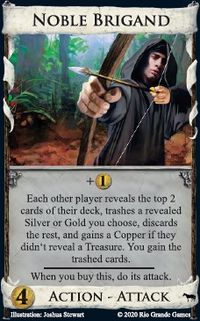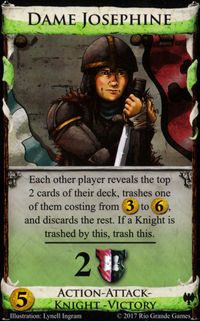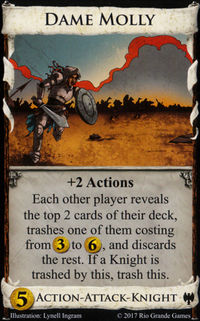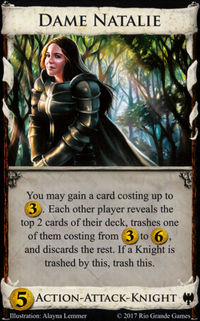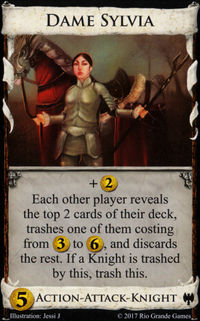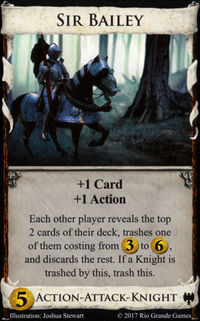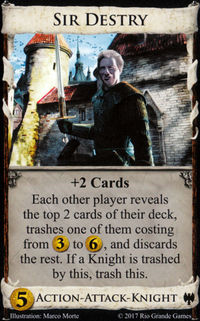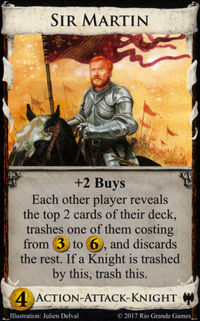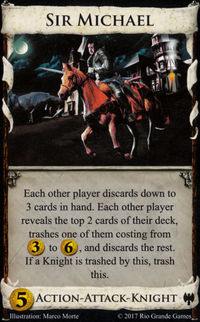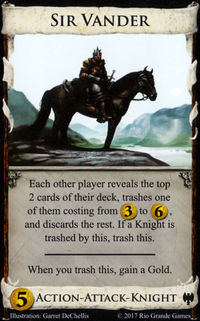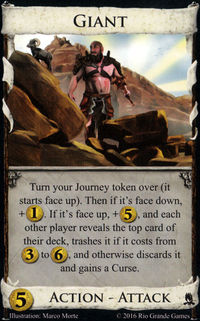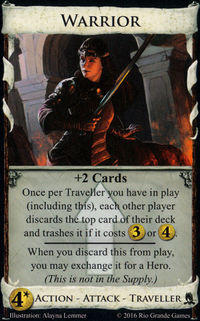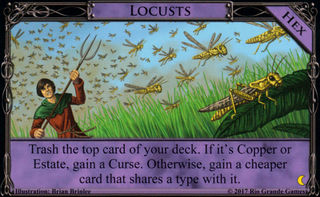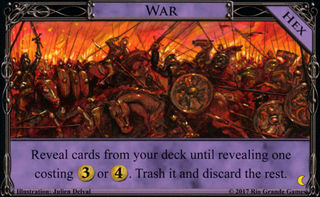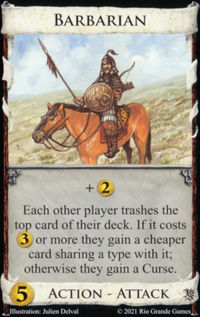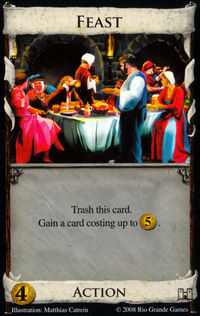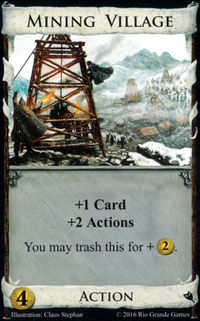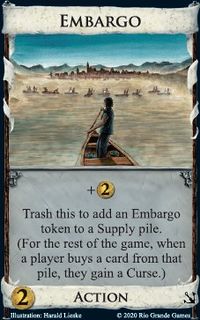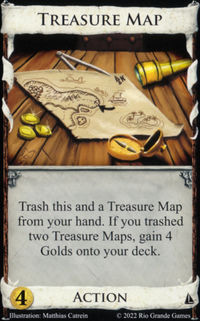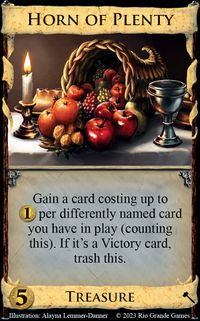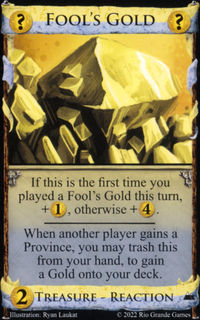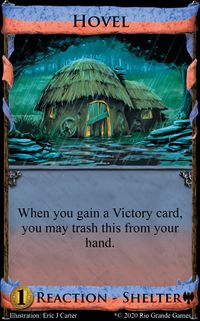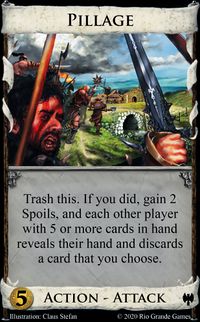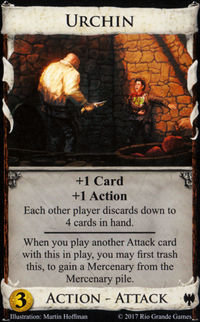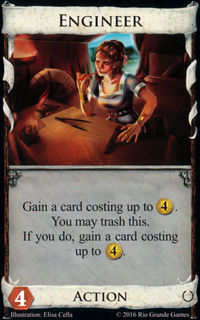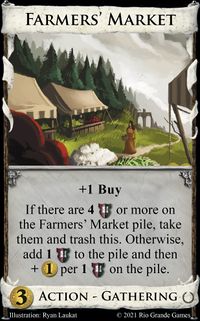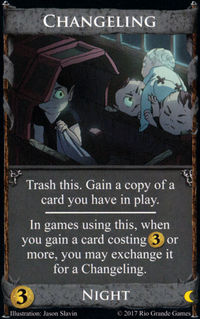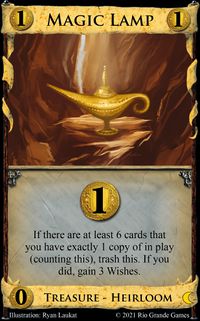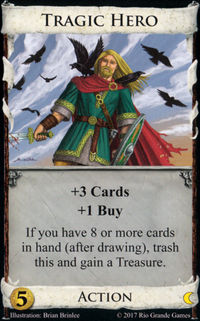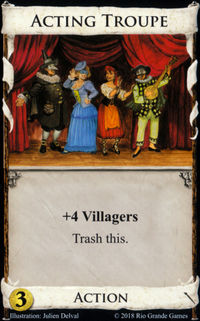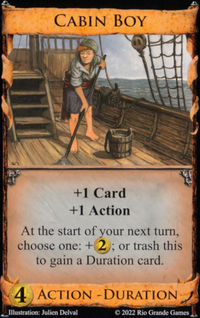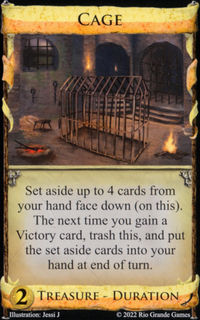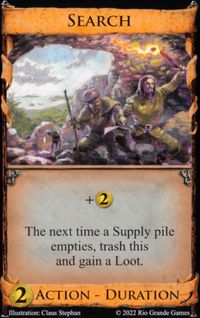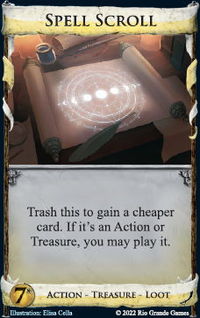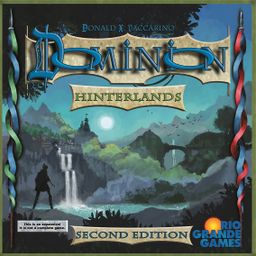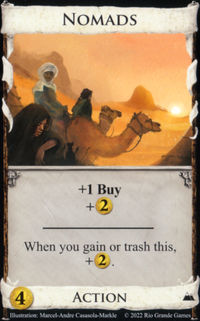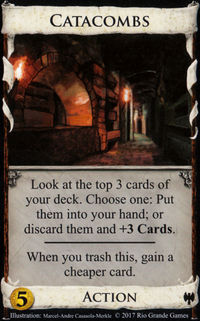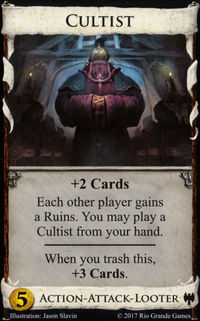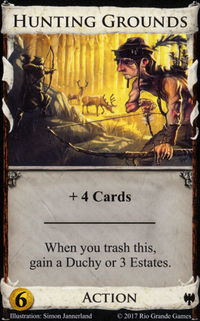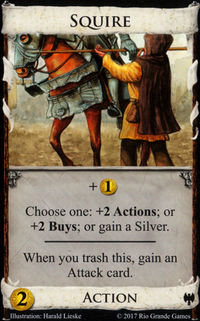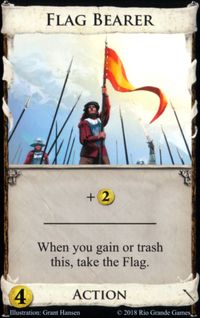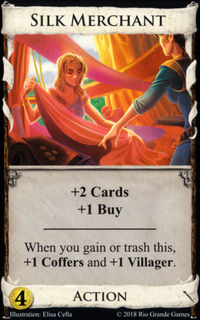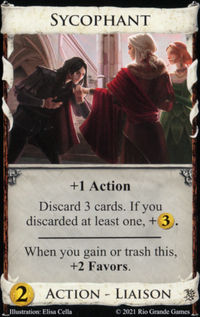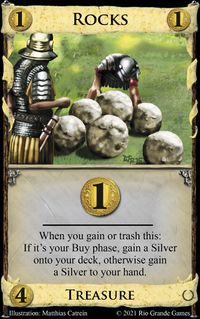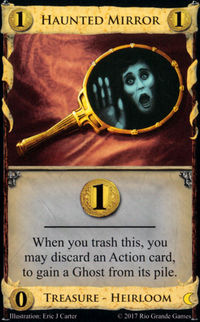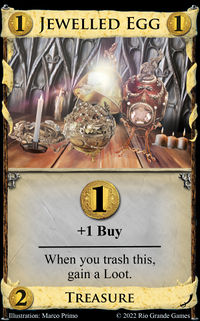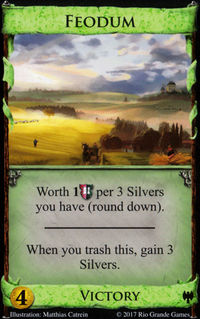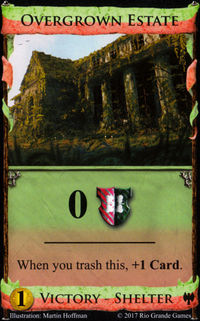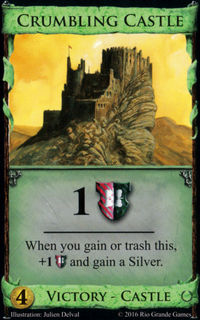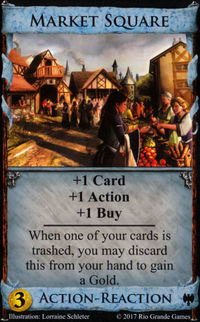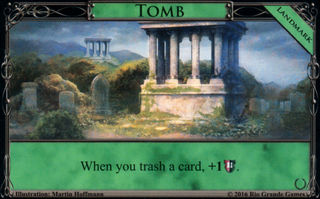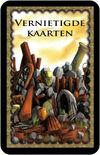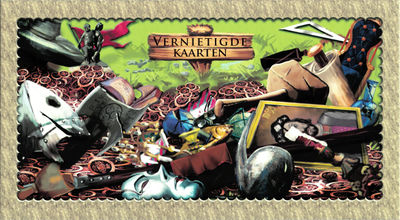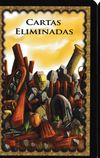Trash
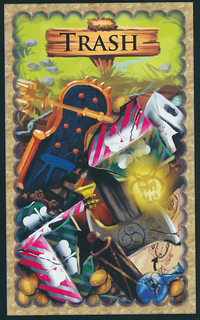
To trash is to remove a card from your deck, placing it in an area called the Trash or Trash pile. This is distinct from discarding, which removes a card from your hand or other area to your discard pile, waiting to be shuffled back into your deck. Trashing a card usually means removing it permanently from your deck, although there are a small number of cards, chiefly Lurker, Graverobber, Rogue, Treasurer, Lich, and Shaman, that can retrieve a card from the trash, and a few cards, Fortress, Lich, and Trail, which can return themselves to you if you try to trash them. In addition to these, Forager and Necromancer have effects that depend on what is in the trash, and the Zombies start the game in the trash. Cards that can move cards to the trash include trashers and trashing Attacks; cards that trash themselves are often called one-shots. There are also cards that give an effect when they are trashed.
Contents |
[edit] Official Rules
- "Trash a card" - Put a card into the Trash pile.
- This is a way of getting rid of a card; a trashed card is no longer one of your cards.
- The Trash pile is on the Trash mat, face up; players may look through the Trash at any time.
- The order of the Trash pile does not matter; players can reorder it.
- Cards in the Trash are essentially out of the game, though some expansion cards can get them.
[edit] Trashers
There are 93 cards, 10 Events, 1 Boon, 2 Projects, 1 Way, 2 Allies and 1 Trait in the game that can trash another of your cards or a card from the Supply during your turn.
- Dominion: Chapel, Mine, Moneylender, Remodel, Sentry
- Intrigue: Lurker, Masquerade, Replace, Steward, Trading Post, Upgrade
- Seaside: Lookout, Salvager, Sailor
- Alchemy: Apprentice, Transmute
- Prosperity: Bishop, Crystal Ball, Expand, Forge, Investment, Loan, Mint, Trade Route
- Cornucopia: Remake
- Hinterlands: Develop, Farmland, Jack of all Trades, Spice Merchant, Trader
- Dark Ages: Altar, Count, Counterfeit, Dame Anna, Death Cart, Forager, Graverobber, Hermit, Junk Dealer, Mercenary, Procession, Rats, Rebuild
- Guilds: Butcher, Doctor, Stonemason, Taxman
- Adventures: Amulet, Ratcatcher, Raze, Transmogrify, Bonfire, Trade
- Empires: Catapult, Gladiator, Sacrifice, Small Castle, Temple, Advance, Donate, Ritual, Salt the Earth
- Nocturne: Bat, Cemetery, Exorcist, Goat, Monastery, Pooka, Zombie Apprentice, Zombie Mason, The Flame's Gift
- Renaissance: Ducat, Hideout, Improve, Priest, Recruiter, Research, Treasurer, Cathedral, Sewers
- Menagerie: Goatherd, Scrap, Animal Fair, Enhance, Way of the Goat
- Allies: Sentinel, Broker, Carpenter, Modify, Acolyte, Student, Peaceful Cult, Woodworkers' Guild
- Plunder: Crucible, Enlarge, Maelstrom, Maroon, Peril, Pickaxe, Pious, Prize Goat, Rope, Scrounge, Secluded Shrine, Shaman, Siren
- Promo: Dismantle, Governor, Sauna, Church
There are 3 cards and an event that may let other players trash one of their cards during your turn.
The Trashing token, via Plan from Adventures, can turn any card from an Action Supply pile into an on-Buy trasher.
Some trashers simply trash cards as their only effect, while others give some benefit in addition. If a trasher gives a benefit varying depending on the specific card trashed, it is further classified as a trash for benefit card.
[edit] Trashing Attacks
There are 21 cards and 2 Hexes that can force an opponent to trash one of their cards. Cards in italics have been removed.
- Dominion: Bandit, Thief
- Intrigue: Saboteur, Swindler
- Seaside: Pirate Ship, Corsair
- Hinterlands: Noble Brigand
- Dark Ages: the Knights (Dame Anna, Dame Josephine, Dame Molly, Dame Natalie, Dame Sylvia, Sir Bailey, Sir Destry, Sir Martin, Sir Michael, Sir Vander), Rogue
- Adventures: Giant, Warrior
- Nocturne: Locusts, War
- Allies: Barbarian
In general, these are considered to be weak relative to other Attacks; while having a card trashed can be one of the most damaging Attacks to happen to you, most trashing Attacks provide little to no other effect for the person who played it. In the long run, the benefit provided by other cards tends to outweigh the loss of a card due to a trashing Attack. Some trashing Attacks can even help to be hit by, if they're getting rid of cards you'd want to lose anyway, such as Coppers. Swindler is typically regarded as the strongest trashing Attack, due to its unique ability to let the attacker choose which card the opponent gains to replace the trashed card; this allows Swindler to be a fairly reliable Curser in the early game.
[edit] Self-trashers
There are 35 cards that can trash themselves. Most, but not all, are classified as one-shots. Cards in italics have been removed.
- Dominion: Feast
- Intrigue: Mining Village
- Seaside: Embargo, Treasure Map
- Cornucopia: Horn of Plenty
- Hinterlands: Fool's Gold
- Dark Ages: Death Cart, Hermit, Hovel, the Knights (Dame Anna, Dame Josephine, Dame Molly, Dame Natalie, Dame Sylvia, Sir Bailey, Sir Destry, Sir Martin, Sir Michael, Sir Vander), Pillage, Urchin
- Adventures: Raze
- Empires: Small Castle, Engineer, Farmers' Market
- Nocturne: Changeling, Magic Lamp, Tragic Hero
- Renaissance: Acting Troupe, Improve
- Allies: Acolyte
- Plunder: Cabin Boy, Cage, Search, Spell Scroll
[edit] When-trash effects
Some cards (and a Landmark and a Project) do something when a card is trashed. Most of these are from Dark Ages, which has a major theme of trashing. These cards must be trashed by something else in order to get this effect; they can't simply trash themselves.
There are 18 cards that do something when they themselves are trashed:
There are 2 cards, 1 Landmark, and 1 Project that do something when another card is trashed:
[edit] Gain from trash
See Gain#Gain from trash.
[edit] Strategy
Trashing is a cornerstone of Dominion strategy; the ability to cull your deck of your weak starting cards (Coppers and Estates or Shelters) is quite powerful, and players who trash early and often will usually trounce players who ignore trashing when it is available. Trashing your weak starting cards has the effect of making your deck cycle more rapidly and have a greater concentration of strong cards. To this end, cheap trashers that can trash more than one card, such as Chapel (considered the most powerful card in the game for its cost) and Steward, will typically be bought on the first two turns. However, trashing without simultaneously adding new cards of value to your deck, namely more expensive Treasures and Actions, can leave you unable to do anything. Therefore, players must weigh whether they want the fastest possible trashing (Chapel), or a slower trasher that continues to be useful after all their starting cards have been trashed (Steward).
Sometimes it is desirable to trash more valuable cards using so-called trash-for-benefit cards, which give greater benefits when trashing more valuable cards. Most are not as efficient at trimming down your deck, but the bonuses they provide counterbalance their slowness. Remake manages to get the best of both worlds, combining relative speed, a cheap enough cost to open with, and the ability to turn your starting Estates into Silvers.
The most obvious use for trashers is to rid your deck of junk cards: Curses and Ruins. While newer players don't always immediately understand the benefit of trashing Coppers and Estates, it's usually quite clear why they'd want to rid themselves of cards that give negative ![]() . While trashing is the obvious counter to junking, junking is actually more often a counter to trashing. By throwing Curses or other cards into your opponent's deck, you're giving them more cards they have to trash, and while all the junker has to do is draw their Attack, the trasher has to manage to line their trashing card up with the junk they've received.
. While trashing is the obvious counter to junking, junking is actually more often a counter to trashing. By throwing Curses or other cards into your opponent's deck, you're giving them more cards they have to trash, and while all the junker has to do is draw their Attack, the trasher has to manage to line their trashing card up with the junk they've received.
Lurker, Salt the Earth, and Gladiator are cards which can trash cards in Supply, and they will combo with when-trash cards.
[edit] Trivia
[edit] In other languages
